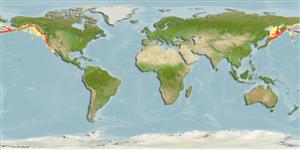>
Gadiformes (Cods) >
Macrouridae (Grenadiers or rattails)
Etymology: Albatrossia: The name of an oceanographic ship "Albatross" (1888-1900) (Ref. 45335); pectoralis: pectoralis refering to the long and narrow pectoral fin (Ref. 6885).
More on author: Gilbert.
Environment: milieu / climate zone / depth range / distribution range
Οικολογία
Θαλασσινό(ά) βαθύβιο(ς); μη μεταναστευτικό(ά); εύρος βάθους 140 - 3500 m (Ref. 50550), usually 700 - 1100 m (Ref. 56476). Deep-water; 62°N - 26°N, 143°E - 115°W (Ref. 1371)
North Pacific: northern Japan to the Okhotsk and Bering seas, east to the Gulf of Alaska, south to northern Baja California in Mexico.
Length at first maturity / Μέγεθος / Βάρος / Age
Maturity: Lm 83.2, range 65 - 102 cm
Max length : 210 cm TL αρσενικό/απροσδιόριστο; (Ref. 56527); common length : 85.0 cm αρσενικό/απροσδιόριστο; (Ref. 56527); μεγ. δημοσιευμένο βάρος: 86.0 kg (Ref. 56527); μεγ. αναφερόμενη ηλικία: 56 έτη (Ref. 39270)
Short description
Κλείδες προσδιορισμού | Μορφολογία | Μορφομετρία
Ραχιαίες άκανθες (συνολικά) : 2; Μαλακές ραχιαίες ακτίνες (συνολικά) : 7 - 9; Εδρικές άκανθες: 0; Μαλακές εδρικές ακτίνες: 131. Snout low, slightly protruding beyond the large mouth, without a spinous terminal scute. Scales small, slightly oblong, with moderate-sized median ridge, without spines or with few weak spinules, and 0 to 5 much lower, non-spinulated ridges laterally on exposed field. Swim bladder small, with 2 retia mirabilia. Gray-brown on head and body, each scale with a prominent dark posterior border, fins and lateral line darker; black in mouth, gill cavity, and on peritoneum (Ref. 6885). Branchiostegal rays: 6-6; pyloric caeca: 12-16;
Young apparently bathypelagic to some degree but become bathydemersal at a size of 50-60 cm (Ref. 1371). Adults feed mainly on cephalopods, fish and shrimps; other food items include ctenophores, echinoderms, worms, crabs, and amphipods (Ref. 1371). Oviparous, with planktonic larvae (Ref. 36385).
Cohen, D.M., T. Inada, T. Iwamoto and N. Scialabba, 1990. FAO species catalogue. Vol. 10. Gadiform fishes of the world (Order Gadiformes). An annotated and illustrated catalogue of cods, hakes, grenadiers and other gadiform fishes known to date. FAO Fish. Synop. 125(10). Rome: FAO. 442 p. (Ref. 1371)
IUCN Red List Status (Ref. 130435)
Threat to humans
Harmless
Human uses
αλιεία: Εμπορικό(ά)
Εργαλεία
Special reports
Download XML
Διαδικτυακές πηγές
Estimates based on models
Preferred temperature (Ref.
123201): 2.2 - 3.5, mean 2.6 °C (based on 120 cells).
Phylogenetic diversity index (Ref.
82804): PD
50 = 1.0000 [Uniqueness, from 0.5 = low to 2.0 = high].
Bayesian length-weight: a=0.00087 (0.00057 - 0.00133), b=3.26 (3.13 - 3.39), in cm total length, based on LWR estimates for this species & (Sub)family-body (Ref.
93245).
Τροφικό Επίπεδο (Ref.
69278): 4.3 ±0.7 se; based on diet studies.
Ελαστικότητα (Ref.
120179): Πολύ χαμηλό, ελάχιστος χρόνος για διπλασιασμό πληθυσμού > 14 έτη (tmax >30).
Fishing Vulnerability (Ref.
59153): High to very high vulnerability (70 of 100).
Nutrients (Ref.
124155): Calcium = 10.4 [5.3, 23.0] mg/100g; Iron = 0.303 [0.155, 0.627] mg/100g; Protein = 17.2 [15.5, 18.9] %; Omega3 = 0.226 [0.101, 0.496] g/100g; Selenium = 41 [17, 98] μg/100g; VitaminA = 4.24 [0.83, 19.44] μg/100g; Zinc = 0.232 [0.151, 0.366] mg/100g (wet weight);
